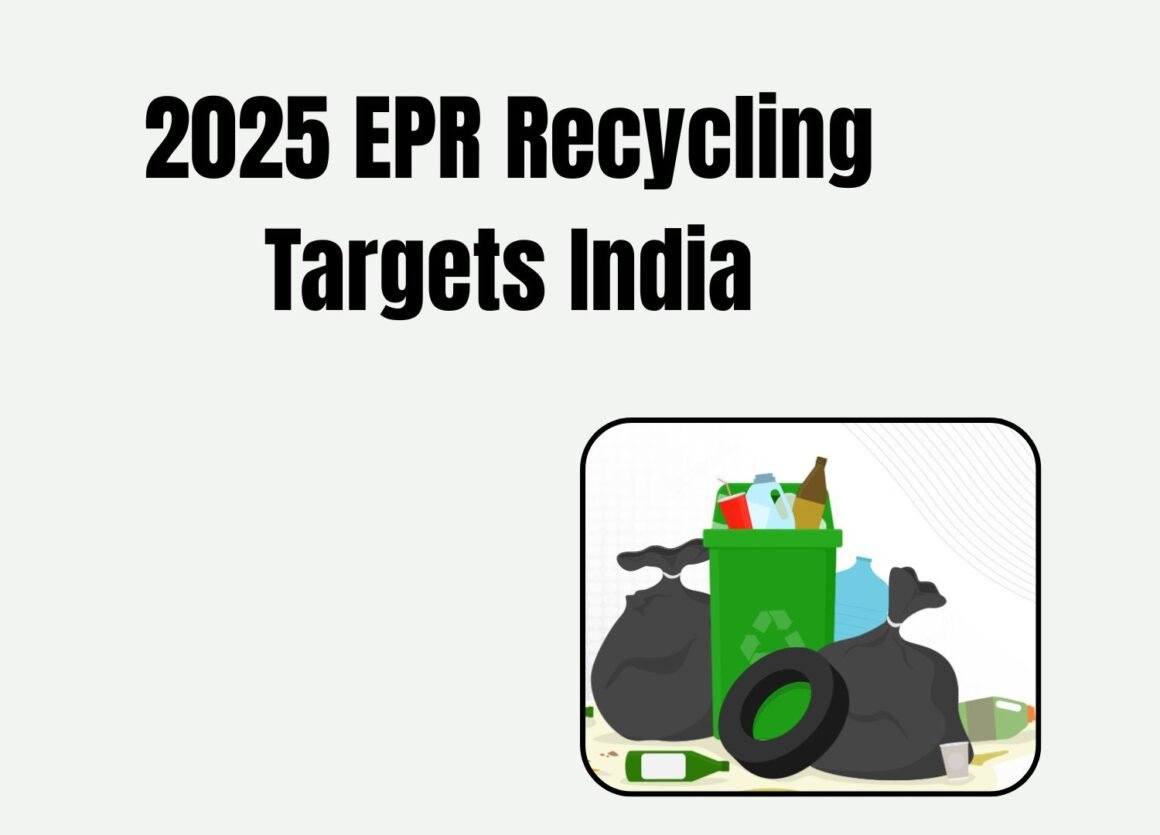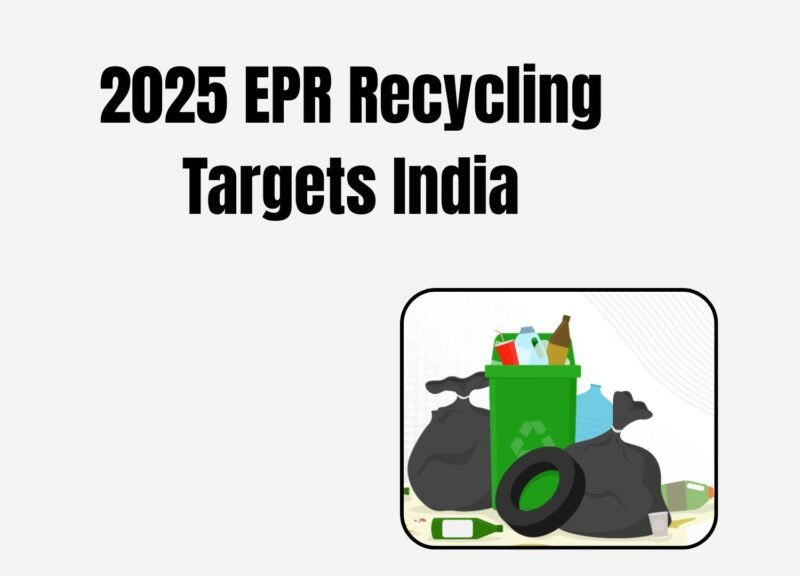2025 EPR Recycling Targets India – The year that will separate sustainable brands from surviving brands
Extended Producer Responsibility (EPR) is no longer a mild sustainability suggestion in India—it is now a legal obligation backed by strict government enforcement. With the Ministry of Environment, Forest and Climate Change (MoEFCC) tightening waste regulations and the Central Pollution Control Board (CPCB) enforcing compliance, 2025 marks a decisive turning point in India’s sustainability law.

The government has introduced mandatory recycling targets, recycled content usage, reusable packaging norms, and digital traceability. These changes affect every brand that uses plastic packaging, including FMCG brands, electronics companies, cosmetic and personal care labels, automotive manufacturers, and e-commerce giants.
This article explains: 2025 ERP Recycling Targets India
- What for 2025 ERP Recycling Targets India mean for brands
- Legal obligations under PWM Rules and CPCB compliance
- Penalties for non-compliance
- Readiness analysis – are Indian brands prepared?
- Action plan to comply with EPR before deadlines
- Real case studies from Indian industries
What Is EPR and Why It Matters in 2025
Extended Producer Responsibility (EPR) is a policy where producers are responsible for environmentally safe management of their product waste after consumer use. Under Plastic Waste Management (PWM) Rules, 2016 (amended in 2022, 2024, 2025) and EPR guidelines, every Producer, Importer and Brand Owner (PIBO) must:
- Collect back plastic equivalent to what they generate
- Recycle a mandated percentage of their waste
- Use recycled content in packaging
- Register and report plastic usage and waste
- Fulfil annual targets for recycling and reuse
- Partner with PROs and recyclers for compliance
- Ensure QR code traceability by July 2025
India generates 34 lakh tonnes of plastic waste per year (CPCB Report 2024), but only 12–15% is recycled. That is why the government has shifted from “awareness regulation” to strict accountability.
2025 EPR Compliance Targets and Deadlines
Below are the official 2025 EPR Recycling Targets India for PIBOs under the MoEFCC and CPCB:
| Compliance Requirement | Mandate for 2025 |
|---|---|
| Plastic Collection Target | 70–80% depending on category |
| Recycling Target | Must recycle collected waste |
| Recycled Plastic in Packaging | Minimum 30% PCR in rigid packaging |
| Reusable Packaging Obligation | 10–15% reusable packaging |
| Traceability | QR code on all packaging from July 2025 |
| EPR Portal Filing | Mandatory quarterly + annual returns |
| PRO/Recycler Partnership | Mandatory evidence of recycling |
These rules apply to rigid, flexible, and multilayer plastic packaging.
Who Needs EPR Compliance in 2025?
EPR is mandatory for: 2025 ERP Recycling Targets India
- FMCG brands (Nestlé, Dabur, HUL)
- Food & beverage brands (PepsiCo, Amul, Coca-Cola)
- Cosmetics & personal care (Mamaearth, Sugar Cosmetics)
- Online stores & e-commerce (Flipkart, Amazon India)
- Electronics companies (Samsung, Xiaomi)
- Importers placing packaged goods in India
- Pharmaceutical and medical device companies
Even small D2C brands selling via Instagram, Meesho, Snapdeal, or Amazon fall under EPR rules if they use plastic packaging.
Penalties for Non-Compliance in 2025
CPCB has already begun enforcement. In 2024, over 700 companies received show-cause notices for not registering on the EPR portal. In 2025, Environmental Compensation (EC) fines will apply under Section 15 of the Environment Protection Act.
| Violation | Penalty |
|---|---|
| Not Registered Under EPR | Up to ₹25 lakh + ban from selling |
| False reporting | Heavy fines + legal action |
| Failure to meet EPR targets | ₹10,000–₹1,00,000 per tonne |
| No plastic audit/reporting | CPCB prosecution |
CPCB has also instructed customs authorities to stop imports from companies without valid EPR certificates.
Are Indian Brands Prepared? – Reality Check
Indian brands can be divided into three readiness groups:
Ready and Active (Top Performers)
These companies are already working on traceable waste management:
- Hindustan Unilever (HUL): Claims 100% recyclable packaging by 2025
- Coca-Cola India: Using 40% recycled plastic (rPET)
- Bisleri: Runs “Bottles for Change” program
- Tata Consumer: Introduced recycled flexible packaging pilot
Partially Ready (Work in Progress)
- Larger FMCG and electronics brands shifting to recycled packaging
- Companies filing EPR returns but lacking reusable packaging plans
Unprepared (High Risk)
- D2C startups avoiding EPR registration
- Small sellers on Amazon & Meesho not declaring packaging
- Importers unaware of EPR compliance rules
By mid-2025, non-compliant brands risk being delisted from platforms like Amazon and Flipkart.
Case Studies – 2025 ERP Recycling Targets India
1. Bisleri – Recycling at Scale
Bisleri has collected over 12 million kg of plastic waste through 3,500+ recycling partners. It uses recycled PET (rPET) in bottles and has successfully linked sustainability with operations.
2. Marico – Packaging Innovation
Marico (Parachute, Saffola) redesigned packaging to use less plastic per bottle. This reduced virgin plastic dependency and improved EPR score.
3. Amazon India – EPR Pressure
Amazon shifted to 100% plastic-free packaging for shipments in India after CPCB notices. This shows that enforcement works.
Challenges Brands Face in Meeting 2025 Recycling Targets India
Despite awareness, brands face these roadblocks:
- Lack of traceable recyclers
- Shortage of quality PCR (post-consumer recycled plastic)
- Higher cost of eco-packaging
- Data reporting challenges
- Confusion about legal procedures
- Fake recycler certificates in the market
Step-by-Step EPR Compliance Roadmap for 2025
| Step | Action Required |
|---|---|
| 1 | Register on CPCB EPR Portal |
| 2 | Conduct Packaging Waste Audit |
| 3 | Partner with Authorized PROs/Recyclers |
| 4 | Start using Recycled Plastic Content (PCR) |
| 5 | Implement Reusable Packaging Strategy |
| 6 | Barcode/QR traceability by July 2025 |
| 7 | file Quarterly + Annual Returns |
Conclusion: 2025 EPR Recycling Targets India
The2025 EPR Recycling Targets 2025 EPR Recycling Targets are not optional—they are law. Companies that treat EPR as a formality will face penalties, trade restrictions, and long-term brand damage. Meanwhile, responsible brands are turning EPR into a competitive advantage, attracting ESG funding, improving sustainability credentials, and winning consumer trust.
EPR is not just a compliance deadline—it is the future of responsible business in India.
FAQs: 2025 EPR Recycling Targets India
1. What is EPR under plastic waste rules?
EPR makes brands responsible for managing post-consumer plastic waste.
2. Who must register for EPR in India?
Every producer, importer, and brand owner (PIBO) using plastic packaging.
3. Is EPR compliance mandatory in 2025?
Yes, mandatory under CPCB and MoEFCC rules.
4. How do brands meet recycling targets?
By partnering with authorized recyclers and PROs.
5. What are the penalties for non-compliance?
Fines under Environmental Compensation and possible business suspension.
FOR MORE BLOGS – beyondthepunchlines.com

 Add to favorites
Add to favorites






